 On February 22, EC Trade Commissioner Karel De Gucht announced that the Commission has referred ACTA to the European Court of Justice. The court has been asked “to assess whether ACTA is incompatible – in any way – with the EU’s fundamental rights and freedoms, such as freedom of expression and information or data protection and the right to property in case of intellectual property… I believe the European Commission has a responsibility to provide our parliamentary representatives and the public at large with the most detailed and accurate information available. So, a referral will allow for Europe’s top court to independently clarify the legality of this agreement.”
On February 22, EC Trade Commissioner Karel De Gucht announced that the Commission has referred ACTA to the European Court of Justice. The court has been asked “to assess whether ACTA is incompatible – in any way – with the EU’s fundamental rights and freedoms, such as freedom of expression and information or data protection and the right to property in case of intellectual property… I believe the European Commission has a responsibility to provide our parliamentary representatives and the public at large with the most detailed and accurate information available. So, a referral will allow for Europe’s top court to independently clarify the legality of this agreement.”
The European Parliament published a statement saying it “will wait for the Court’s ruling before drawing any conclusions. However, in the meantime it will continue its own scrutiny of the agreement.”
A news story in the Guardian quoted MEP David Martin in response to this move:
Trade commissioner Karel de Gucht today admitted that there are still many question marks about ACTA and what the implementation of the agreement, as it stands, would mean for citizens and for the freedom of the internet. The parliament has been calling for more clarity for a long time, and we already requested legal opinions from several committees in the European parliament. Now this ruling will be a good guarantee for the impact on fundamental rights.
However, the Foundation for a Free Information Infrastructure noted that De Gucht did not address health or climate change concerns in his announcement:
Oxfam (pdf), Public Citizen (pdf), Médecins Sans Frontières (pdf), and Flynn and Madhani voiced serious concerns over access to essential medicines – a matter of life and death. Furthermore, the Commission did not assess the effects ACTA may have on diffusion of green technology, needed to fight climate change.
The Commission should ask the Court to also assess global public health concerns. Is ACTA compatible with Human dignity and the Right to life, protected by the Charter of fundamental rights of the European Union, art 1 and 2, the Convention for the Protection of Human Rights and Fundamental Freedoms, art 2, and the Treaty on European Union, art 2?
La Quadrature du Net put out a press release noted that the court’s review will not address important political (as opposed to legal) questions, including:
- Can a wide-ranging interpretation of ACTA’s criminal sanctions (for “infringement on a commercial scale”, including “aiding and abetting”) be used as a bullying weapon by the copyright industry to force Internet actors into deploying contract-based repressive measures?
- What will be the impact on EU policy-making and public debate of casting in stone current repressive policies for which an impact study is still expected, and which are heavily criticized (such as the EUCD and IPRED)?
- Can such a body of policies, impacting EU policy-making, the free flow of information and the freedom to conduct business on the Internet be negotiated instead of democratically debated, and yet be legitimate?
- Is ACTA necessary as we are facing an open conflict between repressive copyright policies and fundamental freedoms, and that other paths could be taken, such as a positive reform taking into account new cultural practices?




